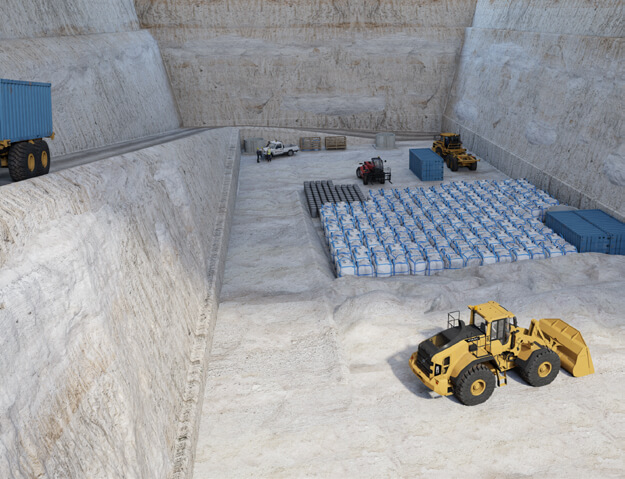PERMANENT ISOLATION OF HAZARDOUS WASTE USING GEOLOGICAL REPOSITORIES
Permanent Isolation (Disposal) of Per- and Poly- Flouroalkyl Substances (PFAS)
THE PROBLEM WITH PFAS
A majority of contamination consisting of per- and poly-fluoroalkyl substances (PFAS) can be traced back to the historical use of aqueous film forming foams (AFFFs), which are used to control fires involving flammable liquids (e.g. aviation fuels).
AFFFs have been in use since the 1960s, when their environmental effects were not well understood. It is now known that PFAS compounds are persistent, bioaccumulative and are toxic to wildlife. They are also associated with several types of cancer in humans.
Historically, the PFAS compounds of note have been perfluorooctanesulfonate (PFOS) and perfluorooctanoic acid (PFOA). PFOS is listed on the Stockholm Convention (2009), and PFOA has a Group 2B carcinogen classification according to the International Agency for Research on Cancer
(IARC). However, the Heads of EPAs Australia and New Zealand, 2018: PFAS National Environmental Management Plan ( ‘PFAS Management plan’) considers the impacts of all PFAS compounds, including fluorotelomers, fluorinated alkyl ethers and polyfluorinated decomposition products.
Fig. 1: Firefighters using AFFF

Production of AFFFs containing PFOS has mostly been phased out and their use is heavily restricted. Unfortunately, previous use has led to widespread environmental contamination. Legacy stockpiles of unused AFFF and PFAS contaminated materials (e.g. soils) have proven difficult to dispose of due to the persistent nature of some PFAS compounds and a lack of suitable infrastructure and facilities in Australia.

HOW ARE PFAS WASTES CURRENTLY MANAGED?
In Australia, wastes containing PFAS compounds must be managed in accordance with the PFAS Management plan.
Where possible, appropriate controls should be in place to allow collection and containment of AFFF and PFAS contaminated waste and subsequently, directed to a facility approved to dispose of such compounds.
According to the Stockholm Convention, waste containing persistent organic pollutants (POPs), such as PFOS and PFOA, must be disposed of in an environmentally sound manner (i.e., in such a way that they are completely immobilised and removed from the biosphere, or destroyed.)
Disposal options for material contaminated with PFAS may include:
- Thermal destruction via high temperature incineration, plasma arc furnace, etc.
- Adsorption onto suitable media, which must then be disposed of at a suitably licensed facility.
- Immobilisation and disposal in a suitable repository.
KEY POINTS
- Legacy AFFFs contain PFAS compounds, notably PFOS, PFOA and 6:2FTS, which are bioaccumulative and toxic.
- PFOS is listed on the Stockholm Convention while PFOA is a Group 2B carcinogen (IARC).
- Previous use of AFFFs containing PFOS, PFOA and 6 : 2 FTS has caused wide-spread contamination of soil and water.
DANGEROUS GOODS
Under the PFAS NEMP Plan, PFAS-contaminated materials are proposed to be treated as Class 9 for dangerous goods transportation.
IMMOBILISATION AND DISPOSAL OF AFFFs
Tellus’ geological repository solution, satisfies the Basel and Stockholm conventions’ definitions of hazardous waste management of POPs in an environmentally sound manner.
These guidelines outline the environmentally sound methods of managing POPs, including the use of a Specially Engineered Landfill (SEL) for disposal. As a geological repository the Sandy Ridge Facility exceeds the requirements of an SEL.
The Sandy Ridge Facility will also incorporate an immobilisation treatment process to ensure that wastes meet Tellus’ Waste Acceptance Criteria (WAC), and to provide an additional barrier preventing the migration of hazardous materials over geological time.
Tellus’ immobilisation treatment involves locking the waste into a cementitious matrix and/or adsorbing it onto a suitable material. The process involves mixing the waste with appropriate ratios of binders and kaolin according to one of several formulations that Tellus has developed, to produce a solid, cementitious block. This block must be capable of withstanding the geotechnical conditions of the cell while immobilising the waste and its absorbed liquid.
Tellus has conducted a study to develop an immobilisation formulation specific to AFFFs. The Western Australian Department of Water and Environmental Regulation (DWER) Interim Guideline on the Assessment and Management of Perfluoroalkyl and Polyfluoroalkyl Substances (PFAS) gives a recommended analytical suite for PFAS and provides guidance on investigation levels in various scenarios. Within this context a commercial sample of AFFF concentrate was obtained for the study and was found to contain a total of 3691 μg/L of PFAS compounds of all types.
A range of formulations were prepared to test the kaolin as a suitable treatment reagent. The ideal formulation was then crushed and subjected to both the Toxicity Characteristic Leaching Procedure (TCLP) and the Australian Standard Leaching Procedure (ASLP) to assess the function of the immobilisation formulation as a man-made barrier.
The leachate generated by both the TCLP and the ASLP was found to contain less than 30 μg/L of the same suite of PFAS compounds. Based on the Interim Guideline and extrapolating to include all PFAS in the sample, the leachate would be suitable for nonpotable and recreational uses.
The geological characteristics (and absence of a water table) make the formation of leachate extremely unlikely at the Sandy Ridge Facility. This, combined with the effective immobilisation process, enables Tellus to accept AFFFs and PFAS impacted materials for permanent isolation at the Sandy Ridge Facility.

THE TELLUS SOLUTION
Tellus is currently developing storage, recovery, and permanent isolation infrastructure in the form of geological repository facilities supported by a “hub and spoke” logistics solution across Australia.

KEY CLIENT BENEFITS
Tellus offers simple, safe and cost-effective storage, treatment and permanent isolation (disposal) solutions for hazardous wastes.
Features and benefits include:
| Quality |
|
| Commercial and risk transfer |
|
| Functionality |
|
| Sandy Ridge availability and innovation |
|
| Regulatory approvals and licensing |
|
| Price |
|
